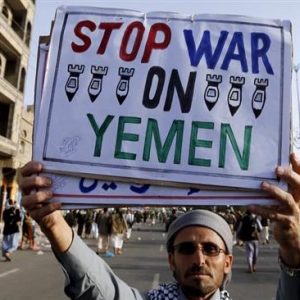Ending U.S. Complicity in Gross Human Rights Violations
From Palestine to Yemen to Afghanistan to Iraq…
U.S. foreign and military policy often suffer from profound contradictions. Realpolitik economic and geostrategic considerations often prevail over professed ideals such as democracy and human rights. Activists devoted to peace, diplomacy, human rights, and democracy can shine a light on these contradictions, and mobilize the public to push for change to hypocritical U.S. policies. Our campaigns are focused on some of the worst human rights crises in the world and where U.S. policy is making the problem worse such as Yemen, Israel and Palestine, and Afghanistan. When looking at these and other issues, the US clearly suffers from a serious case of “do as I say and not as I do.” Because U.S. policy is a main driver of these human-made humanitarian crises, U.S. activists can play an outsized role in changing course in a way that makes the world a better place while actually enhancing U.S. and global security.
AREAS OF FOCUS:
Palestinian Rights After the War
Peace Action is working to promote human rights by ending Israel’s apartheid policies. The expansion of Israeli settlements has increased under the recent right-wing governments, making true peace a distant dream. We’ve thus seen outbreaks of violence in occupied Palestinian lands flaring up regularly. Peace Action wants to see the U.S. defend human rights for all by pressuring the Israeli government to end its violations of international law. We can leverage the massive U.S. military support Israel receives, conditioning or ending it as long as violations continue.
We are also actively promoting Rep. Betty McCollum’s (D-MN) bill to protect Palestinian children and families. Israeli security forces detain around 500-700 Palestinian children every year and place them into a military court system that fails to protect their fundamental rights. Abusive physical violence, including chokeholds and beatings, is experienced by three out of four of these children. These violations have been documented by the UN, the State Department, and human rights organizations. McCollum’s legislation would ensure that no U.S. taxpayer funds are used by the Israeli government for 1) the military detention of Palestinian children; 2) the demolition of Palestinian homes and property; and 3) to further annex Palestinian land in violation of international law.
Yemen: An End to the War & Reconstruction Beyond
 Since March 2015, the U.S. has been supporting a Saudi-led coalition in its brutal war on Yemen. The coalition’s indiscriminate bombing campaign has bombed schools, hospitals, marketplaces, and mosques, killing thousands of civilians in the process — human rights groups and the United Nations have accused the coalition of war crimes. The coalition’s naval blockade, along with its bombing of civilian infrastructure, has pushed Yemen to the brink. Around 17 million people are at risk of starvation. Lack of food, fuel, and medical supplies has also led to ongoing outbreaks of cholera that continue to kill Yemeni people.
Since March 2015, the U.S. has been supporting a Saudi-led coalition in its brutal war on Yemen. The coalition’s indiscriminate bombing campaign has bombed schools, hospitals, marketplaces, and mosques, killing thousands of civilians in the process — human rights groups and the United Nations have accused the coalition of war crimes. The coalition’s naval blockade, along with its bombing of civilian infrastructure, has pushed Yemen to the brink. Around 17 million people are at risk of starvation. Lack of food, fuel, and medical supplies has also led to ongoing outbreaks of cholera that continue to kill Yemeni people.
From the beginning, Peace Action has been building grassroots pressure on Congress to hold the Saudis accountable and end our compliance in the war. This culminated in two successful votes to end U.S. support for the war and block a weapons sale which then got vetoed by President Trump. But we have kept the pressure up, keeping the war on Congress’s radar and ensuring the Saudis knew their support for the war was waning. Last summer, this pressure was attributed to helping bring about a fragile ceasefire, which resulted in talks and an easing in some aspects of the blockade. While the fledgling agreement was not renewed, a de facto truce has kept the bombing from resuming.
Only negotiations can prevent an escalation in violence, though. So we are pushing Congress and the administration to support the diplomatic process and ensure the delivery of humanitarian aid to the millions of Yemenis who could die without it. Peace Action is demanding an end to U.S. complicity in this war, and promoting the diplomatic and humanitarian strategies needed to end Yemen’s suffering, as well as generous investment in reconstruction.
The United Nations has found that investing in agriculture, economic development, empowering women, human capabilities, education, health, and infrastructure can offset the war’s impact on human development within a decade. Furthermore, a World Bank Dynamic Needs Assessment estimated costs for reconstruction at between $20 billion and $25 billion over five years. That amount is less than what Congress has added to the Pentagon budget on top of the President’s request these last few years!
Afghanistan
The longest U.S. war finally came to an end in 2021. However, the devastation was left in the wake, and the U.S. added on by freezing Afghan central bank reserves after the Taliban recaptured power. The U.S. froze over $7 billion of desperately needed money, which left the country unable to pay for aid and services. The resulting humanitarian crisis left the people of Afghanistan facing a famine in the winter of 2021.
Early in 2021, Peace Action held days of action around this issue, mobilizing grassroots support to unfreeze the assets. We partnered with Rep. Pramila Jayapal to call on the Biden administration to act. Finally, after months of mounting pressure, part of the money was moved into a Swiss-based trust fund that will preserve, protect and selectively disburse Afghanistan’s money. The $3.5 billion in the fund is only a start, but it will help the lives of people. Peace Action will continue to work on fulfilling our moral obligation to the people of Afghanistan by pushing for a full release of Afghan assets, provision of humanitarian aid, and an increase in refugee intake for those fleeing the country.
Iraq and Syria
Following the 9/11 attacks, Congress passed the 2001 Authorization for the Use of Military Force (AUMF), which has been used over 40 times to justify U.S. military actions in 85 countries. Intended as an authorization for force against the perpetrators of the 9/11 attacks, the overly vague authorization, with no geographic limits or expiration date, has been stretched beyond belief. The following year’s AUMF against Iraq has also been stretched in recent years. That’s why repealing the outdated AUMFs has been and remains a priority for Peace Action.
Sanctions
Economic sanctions have been overused as a tool of U.S. foreign policy in recent decades, often hurting ordinary people rather than the governments and oligarchs allegedly being targeted, and often oppressing their own populations. U.S. sanctions policies need serious re-evaluation, overhaul, or scrapping altogether and Peace Action is working with allies like Rep. Ilhan Omar (D-MN) to do that.


